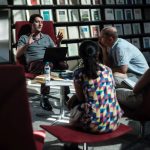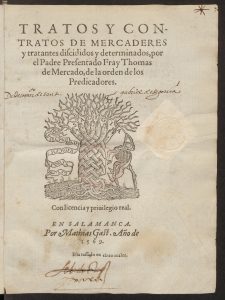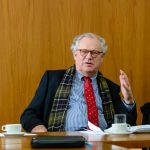
Der Inhalt wird unten in einer verfügbaren Sprache angezeigt. Klicken Sie auf den Link, um die aktuelle Sprache zu ändern.
The project „The School of Salamanca. A Digital Collection of Sources and a Dictionary of its Juridical-Political Language“ invites applications for its second Reading Course:
The discovery and conquest of America in the Early Modern era gave rise to intense debate among European jurists, theologians, and philosophers. Due to the leading role played by the Spanish monarchy in this process of conquests and assimilation of American indigenous peoples, most of the Iberian ‘intellectuals’ took part in the polemic. One of the major figures of this debate – as well as of the School of Salamanca – was the Augustinian monk and professor of theology Alonso de la Vera Cruz († 1584).
While doctrines of authors such as Vitoria and Soto, considered by the historiography as founders of the School of Salamanca, are well known and have aroused the interest of the international scientific community, little attention has so far been paid to Alonso de la Vera Cruz. First holder of the chairs of Sacred Scripture and S. Thomas at the newly established University of Mexico, he can be considered as the teacher who first introduced western philosophy in America.
Vera Cruz wrote the Relectio De dominio infidelium et iusto bello for the inauguration of the University of Mexico (1553). The text is a polemical reflection about the dilemmas related to the process of conquest and subordination of native American peoples which was then still in progress. Having always in mind the famous Relectio De Indis (1539) held by Francisco de Vitoria at the University of Salamanca some years before (with Vera Cruz already overseas), we will discuss the similarities and differences between the legal and political thinking of both authors.
Vera Cruz focusses on two aspects of the Spanish colonial presence in America: the justification of Spanish rule and of the power change from the indigenous rulers to the king of Castile, and that of the legal and moral relations between Spanish settlers, the so-called encomenderos, and the indigenous population. We will analyse Vera Cruz’ juridical positions regarding political dominion, socio-economic domination and questions of private property in America, but we will also look at the religious elements inextricably linked to the political issues, and, in particular, at strategies of evangelization and conversion.
On a methodological level, we will discuss the structure of argumentation as well as the handling of authors, authorities, and citations. By approaching these quintessential features of early modern scholasticism, the participants will gain experience in handling the complex texts of early modern European academia.
The Reading Course addresses advanced students, doctoral students and post-docs from legal studies, philosophy, history, theology, and political sciences. Working language will be English.
Participants working on a research project of their own (master or doctoral thesis) are invited to present and discuss their work during a special section of the Reading Course.
Where
Max Planck Institute for European Legal History
Hansaallee 41
60323 Frankfurt am Main
Program’s Draft
Wednesday, 10.4.2019
Morning:
Arrival
Afternoon:
Greeting, Introduction: Historical Context and Sources
Question: What is dominium? Legal/moral foundations and practical experiences after 60 years of Spanish presence in America
Thursday, 11.4.2019
Morning:
Reading and Discussion
Afternoon:
Project presentations of the participants and of the School of Salamanca
Evening:
Dinner
Friday, 12.4.2019
Morning:
Reading and Discussion
Afternoon:
Reading and Discussion
Final Discussion
Application
Please send your application documents until March 17, 2019 to salamanca@rg.mpg.de.
Required documents for the application are a CV, a letter of motivation, and, if applicable, a project summary.
Eligibility Requirements
- Advanced students, early-stage graduates, PhD candidates, post-docs
- Working knowledge of English is required; German is not a prerequisite
- Basic knowledge of Latin is of advantage
Fees
There is no participation fee. Accommodation will be provided by the organisers. Participants, however, will be responsible for covering their travel expenses.
Contact
Project The School of Salamanca
Dr. Christiane Birr, Dr. José Luis Egío, Dr. Andreas Wagner
salamanca@rg.mpg.de


 Im Juli dieses Jahres hat unser Projektleiter Thomas Duve einen Ausflug ins Frankfurter Städel-Museum gemacht und über seine Sicht auf ausgewählte Werke dort gesprochen, unter anderem über den „Stammbaum der Dominikaner“ von Hans Holbein d. Ä. Am Beispiel von Johannes Vermeers „Der Geograf“ blickt er auf das Delft des 17. Jahrhunderts und die Ausbildung von informellen Imperien. Für alle, die nicht dabei sein konnten, gibt es ein kurzes Video:
Im Juli dieses Jahres hat unser Projektleiter Thomas Duve einen Ausflug ins Frankfurter Städel-Museum gemacht und über seine Sicht auf ausgewählte Werke dort gesprochen, unter anderem über den „Stammbaum der Dominikaner“ von Hans Holbein d. Ä. Am Beispiel von Johannes Vermeers „Der Geograf“ blickt er auf das Delft des 17. Jahrhunderts und die Ausbildung von informellen Imperien. Für alle, die nicht dabei sein konnten, gibt es ein kurzes Video:

